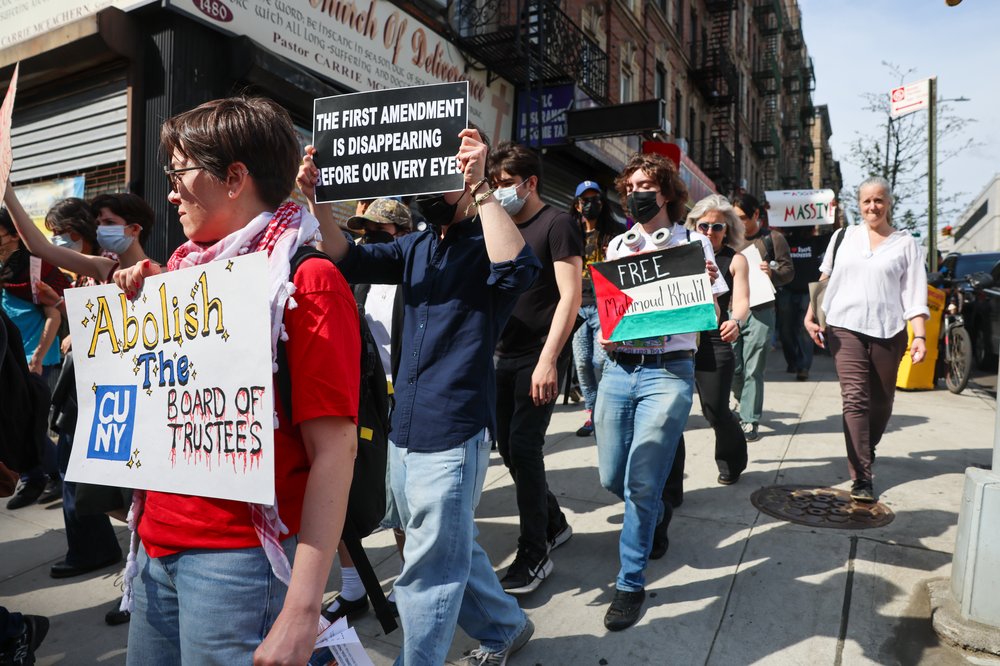As Trump admin restores visas, professors ask why Columbia doesn't fight harder for students
April 25, 2025, 6:58 p.m.
Student activists have been targeted for deportation over their protests of Israel's campaign in Gaza.

Some members of Columbia University’s academic community are questioning why the school hasn’t done more to protect international students, even as the Trump administration made the surprise announcement Friday it would — for now — reinstate canceled visas registrations for students around the country.
Professors reached by Gothamist Friday questioned why the school — a flashpoint in the debate over deportations, after high-profile cases in which foreign students who’d protested Israel’s campaign in Gaza found their legal status revoked — say the school should have fought back against removals they argue were always on shaky legal ground.
Judges in at least 23 states had issued emergency orders temporarily barring the deportation of students whose visas the administration canceled in a federal databae, Time magazine reported. At least 1,200 students had their visa records revoked or their legal status terminated according to the Associated Press, though some groups estimate the number is higher.
“The Trump administration is backing off of a stupid and illegal course of action because they don't want the embarrassment of losing in court, which they absolutely would,” said Dr. Joseph Howley, an associate classics professor at Columbia. “So I think there's a lesson here for universities like mine, which is actually, it's worth fighting back. … It's worth taking the Trump administration to court when they're obviously breaking the law.”
Columbia has been the focus of the administration’s ire after students sustained protests last year against Israel’s bombing campaign, which has now claimed roughly 50,000 Palestinian lives. Trump administration officials accused the university of fostering antisemitism and revoked $400 million in funding to the school, demanding a series of policy changes before money could be restored.
Columbia bowed to many of those demands last month, but is still in talks with the federal government about funding. In a statement earlier this month, acting university President Claire Shipman stressed the school was looking to rebuild its partnership with the federal government, but would “reject any agreement in which the government dictates what we teach, research, or who we hire.”
Howley said however much stress school administrators are feeling, students’ concerns should be front and center.
“The random revocation of visas and visa status has been frightening to everyone,” Howley said. “Every student has to wake up every day and figure out whether they're still allowed to be here, and I think it's a huge relief that there seems to be some reversal on that.”
Columbia has been the focus of multiple controversial ICE maneuvers. Attorneys for Palestinian-born student activist Mohsen Mahdawi, a legal permanent U.S. resident of more than 10 years, say he was trapped by immigration officials during a routine check-in and then arrested. A memo from Secretary of State Marco Rubio described by the New York Times accused him of engaging “in threatening rhetoric and intimidation of pro-Israeli bystanders,” though classmates and professors described him to Gothamist as someone who worked to build connections with Jewish students and condemned antisemitism.
And this month, a Louisiana judge ruled that another Columbia anti-war protester, Mahmoud Khalil, can be deported. Khalil had been the first of several pro-Palestinian students across the country targeted for removal by the Trump administration.
The Trump administration said Friday it would "provide a framework" for visa record terminations in the Student and Exchange Visitor Program, or SEVIS, which tracks students' compliance with their visa requirements. The administration said it reactivate a wave of recently canceled records until that framework is in place.
In her mid-month statement, Shipman described international students as “essential to our unique and powerful ecosystem” and “experiencing enormous distress.” She said the school was "following with great concern the various actions being taken by the federal government toward members of our community," but didn't criticize specific actions or policies.
Shipman's statement emphasized assisting students with unexpected expenses and challenges, including providing logistical, legal, and mental health support.
Howley, the classics professor, said the university should do more to protect students’ free speech.
“We still have this other problem, which is: Students who have been accused of protest activity or protected political speech that someone in the State Department or on social media doesn't like have been getting detained and disappeared by the feds,” he said. “And that threat still hangs over the heads of a lot of students, I think.”
Other professors criticized Columbia as staying silent while student visas were revoked.
“It's un-American to arrest people and detain them without charge for expressing a political opinion,” Math professor Michael Thaddeus told Gothamist. “Our university was not willing to say that. I think they have exaggerated concerns about legal liability and about privacy issues surrounding the case of individual students.”
A Columbia spokesperson asked for clarification on the professors’ criticisms late Friday afternoon before providing any reply. This story will be updated further if Columbia provides any further response.
Thaddeus said that even if the school determined it couldn’t speak out about individual students, “they could just say that arbitrary visa cancellations and arbitrary arrests and detentions without charge are, are unprecedented, un-American and intolerable.”
Judge orders detained Columbia student Mohsen Mahdawi to be held in Vermont for now U.S. immigration judge rules recent Columbia grad student Mahmoud Khalil can be deported Columbia bows to Trump administration, hoping to restore federal funding